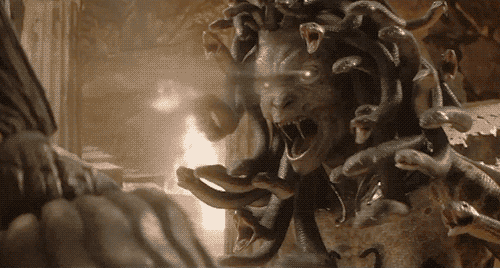desidere: uncleclustersthirdbrain: renlyslittlerose: mildlyamused: oh man wouldn’t it be GREAT
desidere:uncleclustersthirdbrain:renlyslittlerose:mildlyamused:oh man wouldn’t it be GREAT if Hollywood gave Medusa the movie treatment and showed her as the tragic wronged hero she was? Just chillin’ out as a just a ordinary woman until Poseidon raped her in Athena’s temple and instead of being like “DUDE UNCLE NO WTF ARE YOU DOING?!” and smiting him, Athena punished the victim and turned her into a monster with snakes for hair…only wait Athena isn’t an idiot and how could she even punish the god of the sea? But she could give Medusa the power to make sure no man ever laid a goddamn finger on her again. Until Perseus traipsed in and fucked it all up. Way to go idiot. I bet if you’d just asked nicely she might have turned shit to stone for you. Okay I am seeing this type of commentary frequently, and I have to say something about this because it has been bothering me. In the original myth, the rape/transformation of Medusa never happened. This was added in by the Romans— Ovid, specifically, who changed the myth in his Metamorphoses that was written in 8 CE. The entire theme of these tales was the transformation of mostly women who were perused by the gods in some form or another (some men were also transformed throughout the series, such as Hyacinth.) Prior to this, during Archaic Greek times and Classical antiquity, Medusa was never a beautiful maid who was transformed by Athena (and I am gonna get into the whole situation with Athena being a feminist figure in a second.) She was a gorgon born from two underworld monsters, Ceto and Phorcys. This story is outlined in Hesiod’s Theogony which is sort of the accepted canon of Greek creation myths. It was in the 5th century that she was shown by artists to be beautiful but still a monster, and it wasn’t until Ovid showed up that she was the human maid who was raped by Poseidon. Also, many Greeks and Romans read Ovid’s version of the tale as Athena being outraged at Medusa for having been raped in her temple— it was a punishment, not some mercy shown to her. Because guess what— Athena was a grade-A asshole just like her father, who often sided with men rather than women. In fact, she saw herself as a man and not as a woman. Physically, yes she was a woman, but mentally, because she came from Zeus’ head and was not born of any woman, she considered herself male in all respects. Therefore, her intelligence and strength was indicative of her masculine side. This is all explained in Aeschylus’ Oresteia, in which Athena as a judge, ends up siding with Orestes when it came to the murder of his mother, Clytemnestra. She stated she sympathized with Orestes because he was a man, and she would ‘defer to all things’ as her father would. Athena was never seen by the Greeks (and to some extent the Romans) as a strong female figure. She was a man in thought and in action, female only in her figure. So the original story of Medusa was that she was a monster— born of monsters and resided on earth to be defeated by a Greek demigod who goes by the name Perseus. Had Athena really been ‘protecting’ Medusa, she’d not have given Perseus a mirrored shield, and she wouldn’t have placed Medusa’s head on her shield after Perseus cut it off. The Greeks and Romans did not see her as a person in which to empathize with. I’m all fine and good with people in literature classes reading this myth through a feminist lens, but I see a lot of these posts on Medusa that come off as historical. Only trouble is, they see things through this modern view when you need to look at it through the perspective of the ancients— from the view of those who wrote it and who their intended audience was. And I think both sides of the myth should be told; the original and the changes Ovid made. Don’t just explain one side of the story. There were multiple sides and changes and adaptations, and they should both be discussed and examined.I’m such a mythology nerd read this and enlighten yourselfdamn everyone was just schooled A+ STUNNING BREAKDOWN OF THE CAUTIONS OF READING AGAINST THE GRAIN -- source link
#mythology
